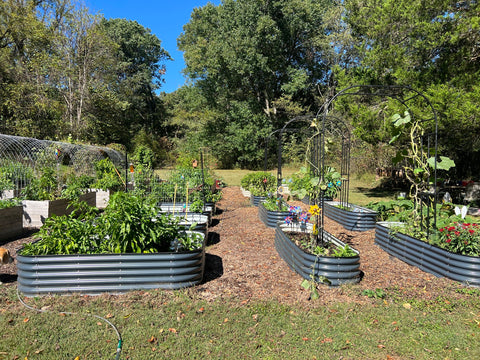Weathering the Storm_ Raised Garden Bed Gardening with Resilient Plants
As gardening enthusiasts, we often find solace and joy in nurturing our plants, watching them thrive under the sun's warm rays. However, Mother Nature can be unpredictable, and stormy weather can pose challenges for our beloved gardens. Fear not! In this article, we'll explore the world of raised garden bed gardening and discover how resilient plants can weather the storm and continue to flourish even in adverse conditions.
The Benefits of Raised garden bed Gardening:
Raised garden bed gardening offers a range of advantages, particularly when facing stormy weather. Here are some key benefits:
Improved Drainage:
- Raised garden beds provide excellent drainage, preventing waterlogging during heavy rains. Excess water drains away more efficiently, reducing the risk of root rot and other water-related issues.
Prevention of Soil Erosion:
- Storms can lead to soil erosion, but raised garden beds help to mitigate this problem. The contained structure of raised garden beds prevents soil from washing away, keeping your garden
Warmer Soil:
- Raised garden beds warm up faster in the spring, providing a head start for plants. In stormy weather, this can be a crucial factor in maintaining optimal soil temperature for plant growth.
Customizable Soil Quality:
- With raised garden beds, you have greater control over the quality of your soil. You can amend and tailor the soil to suit the specific needs of your plants, promoting healthier growth.
Selecting Resilient Plants:
Choosing the right plants for stormy weather is key to a successful raised garden bed garden. Opt for varieties that can withstand wind, heavy rain, and fluctuations in temperature. Here are some resilient plant options:
Drought-Tolerant Herbs:
- Herbs like rosemary, thyme, and sage are not only flavorful additions to your kitchen but also incredibly resilient. They can withstand both drought and excess moisture.
Native Perennials:
- Native plants are adapted to local climates and are often more resilient. Consider perennials like coneflowers, black-eyed Susans, or lavender for a burst of color and resilience.
Leafy Greens:
- Plants like kale, Swiss chard, and spinach are hardy and can endure stormy conditions. Plus, they make for delicious and nutritious additions to your meals.
Rain Garden Plants:
- Include species that thrive in wet conditions, such as astilbe, bee balm, and iris. These plants not only tolerate heavy rain but also contribute to the beauty of your garden.
Storm-Ready Gardening Practices:
Secure Raised garden beds:
- Anchor your raised garden beds securely to the ground to prevent them from being displaced during strong winds. This ensures the structural integrity of your garden.
Mulching:
- Apply a layer of mulch to the soil surface to regulate soil temperature, retain moisture, and prevent erosion. Organic mulches like straw or bark also add nutrients to the soil.
Sturdy Supports:
- For taller plants, use stakes or cages to provide additional support during storms. This prevents bending or breaking, ensuring your plants stay upright and healthy.
Conclusion:
Raised garden bed gardening with resilient plants is a smart strategy to combat stormy weather and nurture a thriving garden. By selecting the right plants and implementing storm-ready practices, you can enjoy the beauty of your garden even when the weather is less than ideal. Embrace the resilience of nature and let your raised garden beds become a stronghold against the storm!


